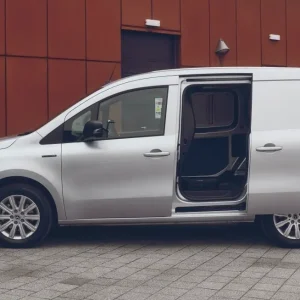The number of new LCVs sold in the UK grew by 2.4% in 2019, according to figures from the Society of Motor Manufacturers and Traders (SMMT).
A total of 365,778 LCVs were registered during the year – the third-highest total on record. The result followed a slight dip in sales of 1.3% between 2017 and 2018.
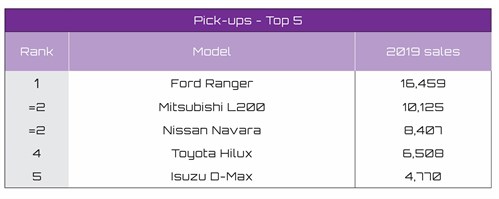 Vans weighing from 2.0t to 2.5t recorded the biggest growth, up by 10.5% to 56,282 registrations.
Vans weighing from 2.0t to 2.5t recorded the biggest growth, up by 10.5% to 56,282 registrations.
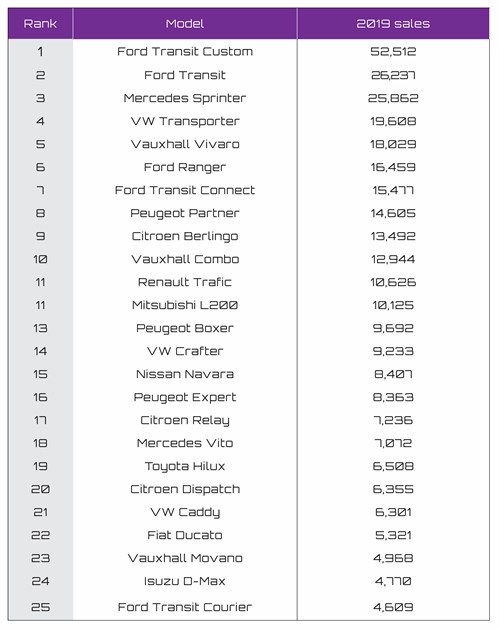 Vans weighing less than 2.0t were up by 4.4%, to 26,162 registrations, while the 2.5t-3.5t van sector – by far the market’s largest – recorded 4.2% growth with 228,659 registrations.
Vans weighing less than 2.0t were up by 4.4%, to 26,162 registrations, while the 2.5t-3.5t van sector – by far the market’s largest – recorded 4.2% growth with 228,659 registrations.
Perhaps surprisingly, the pick-up truck market, which has often bucked downward trends in recent years, fell back 1% on the year, with 53,055 registrations, while the niche 4×4 sector was down by 9.7%, with 1,620 vehicles sold.
The annual market figures were helped by a strong end to the year, with volume in December up by 7.8% year-on-year, following a downturn in each of the three previous months.
The SMMT said the December market was boosted by an easing of regulatory changes and attractive offers on new models, while the overall growth in 2019 was driven by buyers being keen to switch to new, cleaner models to comply with clean-air zone requirements and meet increased demand for online shopping deliveries, despite political and economic uncertainty persisting for much of the year.
SMMT chief executive Mike Hawes said: “A healthy van market is good news for the industry, environment and Exchequer and so the rise in 2019 registrations is very welcome.
“As we enter a new decade, however, we need this upward trend to continue if we are to address environmental concerns. The quicker these new vehicles become commonplace, the quicker their positive impact on air quality and climate change will be felt.
“Manufacturers will continue to invest in new, cleaner technologies but, ultimately, it is businesses that will determine the pace of change. Business positivity is essential to give companies the confidence to invest in their fleets.”
(Continued from Page 1) The Ford Transit Custom easily retained its place as the UK’s best-selling LCV in 2019, with 52,512 registrations, more than twice as many as the second-placed Ford Transit, which recorded 26,237.
Sales of both models, which were updated this year, were down on the previous year, however, with the Custom from 54,806 and the Transit from 32,694.
The Mercedes-Benz Sprinter came third on the sales chart, with 25,862 registrations, leapfrogging the Volkswagen Transporter (19,608). VW’s medium van is likely to present a stiffer challenge this year though, once the facelifted version, the T6.1, has bedded in.
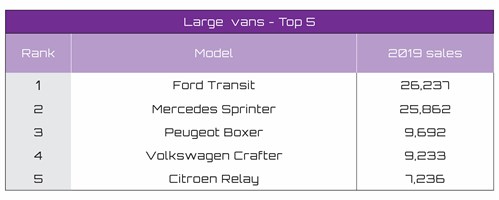 The Vauxhall Vivaro (18,029) was the fifth bestseller, and completing the top 10 were the Ford Ranger (16,459), Ford Transit Connect (15,477), Peugeot Partner (14,605), Citroen Berlingo (13,492) and Vauxhall Combo (12,944).
The Vauxhall Vivaro (18,029) was the fifth bestseller, and completing the top 10 were the Ford Ranger (16,459), Ford Transit Connect (15,477), Peugeot Partner (14,605), Citroen Berlingo (13,492) and Vauxhall Combo (12,944).
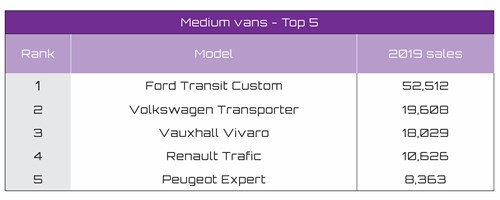 The Combo’s performance was the most eye-catching as it benefitted from a PSA bounce following Vauxhall’s acquisition by the French group.
The Combo’s performance was the most eye-catching as it benefitted from a PSA bounce following Vauxhall’s acquisition by the French group.
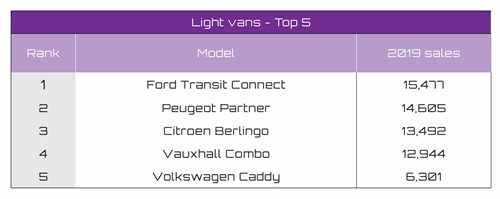
Now built on the same platform as the Peugeot Partner and Citroen Berlingo, its sales rocketed from 2,539 in 2018 when the previous version, which was based on the Fiat Professional Doblo Cargo, was on run-out, to finish 2019 as the UK’s fourth most popular light van and 10th biggest seller overall.
While Ford’s sales were down 6.8% year-on-year to 117,500 units it still commanded a 32% share of the overall market and, just like last year, boasted the top model in every major sector.
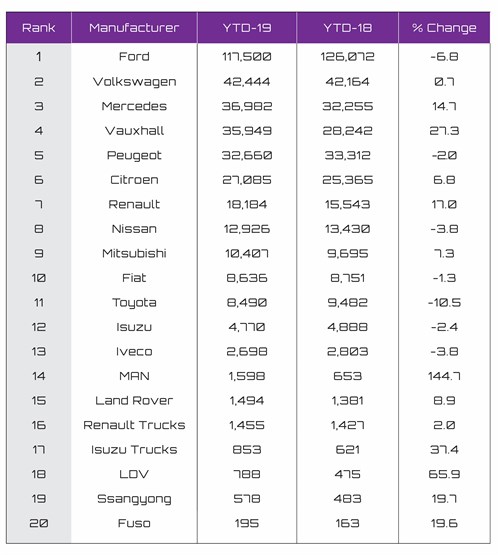
Volkswagen held onto second place with sales of 42,444 being on a par with the previous year, but Mercedes and Vauxhall saw surges of 14.6% and 27.3% to finish within a whisker of each other on 36,982 and 35,949 registrations respectively. Both brands overtook Peugeot, which dipped 1.9% to 32,660 but retained its place in the top five.
Renault, which introduced revised Trafic and Master vans in 2019, saw sales rise 17% year-on-year to 18,184, but its alliance partner Nissan was less successful with a 3.8% dip to 12,926 registrations.
Emerging brand MAN, which is better known for HGVs but entered the LCV market in 2017 with its TGE, a large van based on the Volkswagen Crafter, began to gain a foothold last year with registrations leaping 145% to 1,598.
A brand with a long history in British light commercial vehicle manufacturing, LDV, which ceased production in 2009, is starting to gather some momentum as it attempts to make a comeback under the ownership of Chinese giant SAIC. Having returned to the UK in 2016, LDV sales grew by 66% last year to the, still modest, total of 788 units.




